













Lana Thompson - Editor
Welcome to the latest edition of the Infinity Gaming Magazine and also the special feature for the lucky people who made it to the finals of the 2025 Women in Gaming Diversity Awards. It truly amazes me and our judges the increasing amount of entries each year and so many inspiring entries and stories, so many deserve recognition, but only a very lucky few will receive an award on the 5th June at the iconic Savoy Hotel.
It truly is my most favourite event of the year, with the whole room supporting each and every winner, it really is an amazing atmosphere and hope to see you all there in this celebration of inclusion and diversity within our industry.
This is of course is not possible without the support of our great sponsors, this year they are Digitain, Pronet Gaming, Betsson Group, Bally’s, Arrise, Playtech, Relax Gaming, IGT, Gamomat, Green-
tube, Light & Wonder and not least Soft2Bet.
We are so proud that many companies now see the WIG Diversity as an important event.
On to the magazine, we return to recap two great sessions at the London Gaming Congress (LGC), which took place in March this year and will return again for 2026. The panel discussions features are from Diversity & Inclusion and the iGaming Affiliate World. Both were superb and we can’t wait to host the second edition of the LGC, going to be huge!
Enjoy the May edition of the magazine and next time I write to you we will be celebrating the WIG Diversity Winners in June.
“To Infinity and Beyond!”
Regards, Lana
The Editor & Chief
CONTACT US
Clever Duck Media Centrix@Keys
Keys Park Road
Staffordshire WS12 2HA UK Tel: +44(0)1543 478 889
PRODUCTION
Clever Duck Media Centrix@Keys
Keys Park Road
Staffordshire WS12 2HA UK
PUBLISHING
Infinity Gaming Magazine is operated by © Clever Duck Media Ltd ® Company Reg. No. 687 1018 (Registered in England) V.A.T reg. no 972 6372 91
Sponsorship Opportunities Colin@cleverduckmedia.com
Business Partnerships Svetlana@gaming-awards.com
Marketing & Advertising Maria@cleverduckmedia.com
Editorial Content & PR media@cleverduckmedia.com









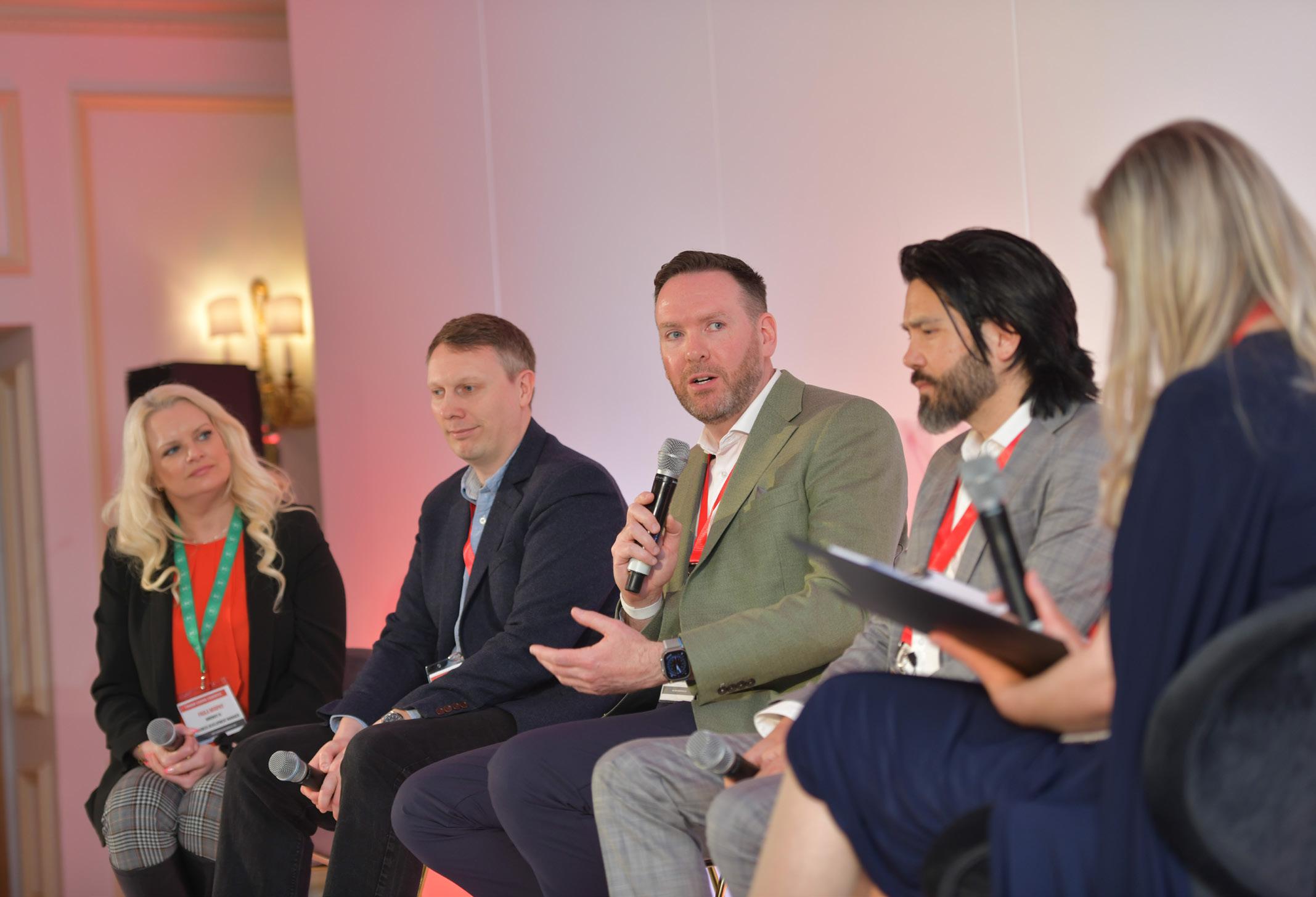
The London Gaming Congress was held at the iconic Savoy Hotel, a luxurious venue located on the banks of the River Thames. This historic site is known for its elegance and central location, making it an ideal setting for such a prestigious event.
Accessibility: The Savoy is easily accessible via public transportation and is close to major attractions.
Comfortable Setting: All attendees enjoyed a comfortable and professional environment conducive to networking and learning.
Culinary Delights: Experienced exquisite dining options that the Savoy had to offer.
London: A Global Gambling Hub
The UK is recognized as one of the world’s leading gambling markets, mak-
ing London the perfect backdrop for this congress.
Vibrant Industry: With over 900 licensed online gambling companies, the UK is a bustling hub for gaming.
Economic Impact: The gambling industry contributes significantly to the UK economy, generating billions in revenue.
Cultural Attractions: Take advantage of your visit to explore London’s rich history and vibrant culture.
As the gaming industry continues to evolve, the London Gaming Congress will address key trends that are shaping its future.
Emerging Technologies: Explore the role of AI, blockchain, and VR in the gaming sector.
Regulatory Evolution: Understand how regulations are adapting to new technologies and market realities.
Consumer Expectations: Learn about shifting consumer preferences and how to meet them.
The London Gaming Congress promised and delivered to be an invaluable experience for anyone involved in the gaming industry. With its focus on networking, learning, and collaboration, the event is a unique opportunity to gain insights and forge connections that can drive your business forward.
Whether you are a seasoned professional or new to the industry, the congress offered something for everyone. Don’t miss out on the chance to be part of this pivotal event in the gaming landscape. Mark your calendars for March 2026, and prepare to immerse yourself in the future of gaming.

with Stake and the scandal with the Bonnie Blue advertiser. Who, she? You don’t know her, do you? Where does the buck fall? Where do we draw the line? What responsibility do the affiliates have with that? Is the main responsibility with the operator or is the fault of the affiliate there? I think on paper, it’s both?
Yeah, legally, it sucks, right? And the problem is that what we have right now is affiliate marketing is not regulated. So it is only the operator that is carrying the liability for advertising something which should not be advertised on a place where it should not be advertised. Because the affiliate has no legal liability to do that or not.
So how, I mean, Stake is taking the
blame and Stake was and is responsible for checking where the affiliate is actually advertising and how compliant it is. But does the affiliate really care? Unless there was a clear contract between the affiliate and the operator where the rules are written, then it is the responsibility of Stake to make sure that their advertisement is portrayed out there the way they want and they should. And obviously, they surrendered their licence, so they’ve taken that responsibility.
So I run Rightlander and we do compliance scanning of affiliates for a variety of people, mainly operators, also sort of game developers and various people. And the reason for that is because the perception in most regulated territories is that the operators should be responsi-
ble for their output.
And operators choose to use affiliates, and we’ll come onto that in a bit more detail later because affiliates are an incredibly important part of the ecosystem. TripAdvisor’s an affiliate, Compare the Market’s an affiliate, Daily Telegraph, Guardian, they’re all sub-affiliates. So I think the idea of an affiliate is misunderstood by anyone, or pretty much everyone actually, in terms of what they can do.
But ultimately, the affiliates themselves, although you can give them a certain amount of responsibility to do things right, and I was an affiliate for 12 years, they need to be educated to know what to do. And because the regulations themselves are quite often open
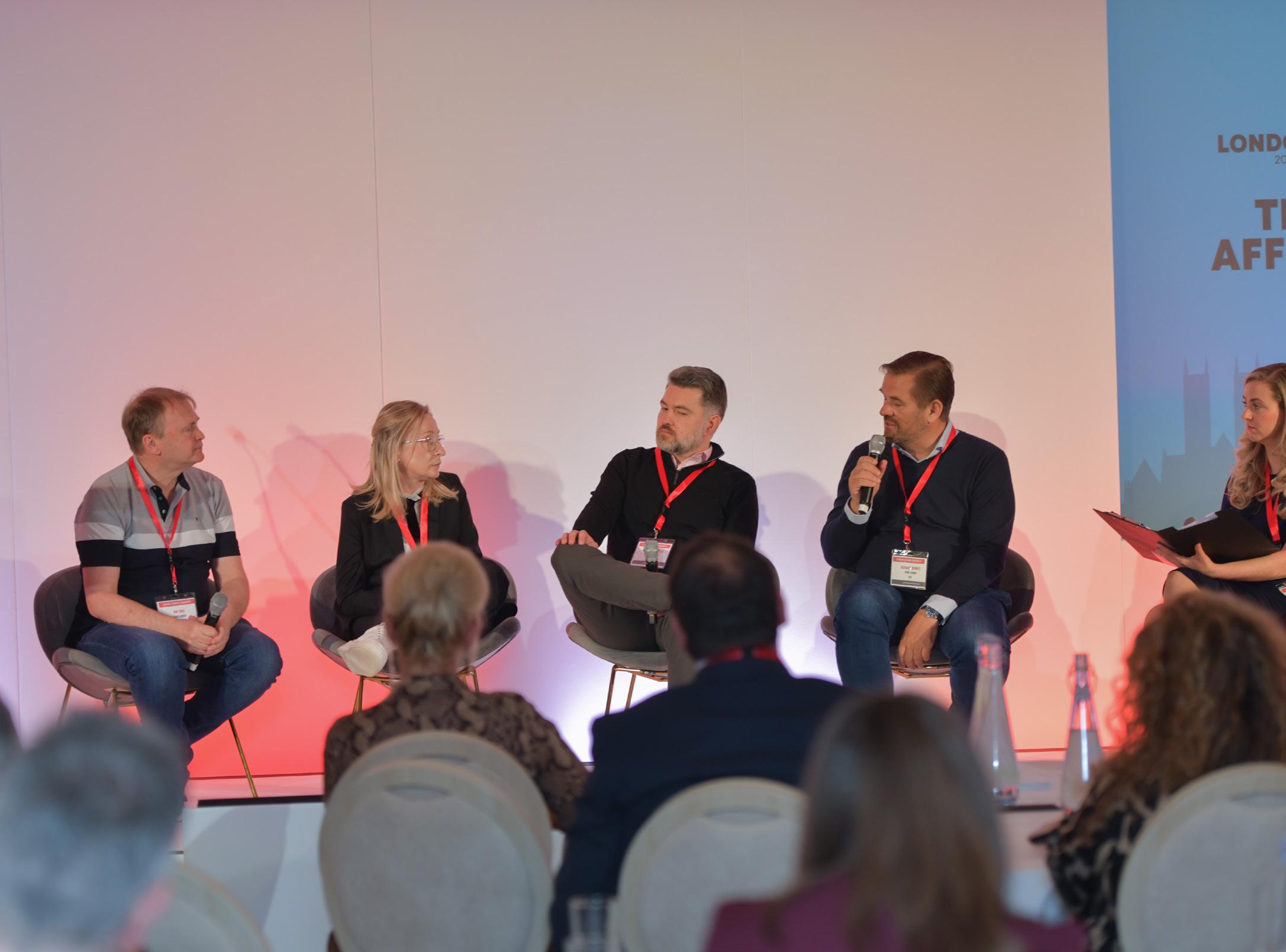
There’s certain things that are obvious, and there are certain things that are less obvious, and there are certain things that have repercussions that aren’t obvious. So I think the reason the operator is held responsible is because they understand what their social responsibility should be. But we’ll come onto that in a bit more detail later when it comes to the affiliate’s role, I think.
But it’s risk reward. Is anyone from Staken here, by the way? Just checking. So we don’t work with them, but, well, I don’t think we work with them anyway, but what we get is I get M&A opportunities for grey market, black market affiliates all the time.
And I look at their roster, who’s paying the money, and Stake is number one in many, many cases. So they’ve obviously got a strategy. They have sponsored the football teams.
They want the awareness as high as they can with the demographics we were talking this morning about. You were talking this morning about these younger age groups and the Snowflakes and everything else, but they’re also target market for these kinds of operators. Absolutely.
And there’s a thing called rage bait, which is where you create as much anger as you possibly can. We were sitting on a stage in
about
I’d never heard of it.
Honestly, I’d never heard it before, and it made me look up, and it’s like, wow, okay, that’s fair enough. I just looked at the story. And they’re in the business of rage baiting.
That’s what they do. And so if you’re a brand and you want quick attention with Snowflake generation, or whatever you want to call the millennials, you rage bait to death. You do as much rage bait as you possibly can.
And yes, they’ve given up their licence, but yes, they’re still on the front of football shirts. And they’re still advertising the
And if I had to compare the amount of CPAs I’m getting offered by onshore and offshore operators, it’s 10x, 10x between onshore and offshore operators. So we’ve got that very thin high wire act to say, right, are we doing the right thing, or are we doing the profitable thing? That’s very, very tricky at the moment. That’s the difference, isn’t it? Anything to add on that, Tom? Yeah, I mean, just to extend on that, I mean, being an affiliate in a regulated market, which we are in the UK, and we’re not a particularly big affiliate in the UK market, we see, I guess the bigger picture here is that, you know, as costs rise, and in the last panel, we’re talking about social responsibility and investing more in compliance.
Probably a big reason why companies don’t do that is because they’re trying to eke out margins for as long as possible to hit the next quarterly report. And the affiliate, I guess, falls further down the funnel in that respect. Of course, you’ve got PLC affiliates as well, they’re super-sized businesses.
Richard’s obviously at that stage as well. Well, yeah, you’re right, you have to choose between your left and keep it clean, or you go right and go to the back market. And, you know, there is this audience, and it is, to Richard’s point, a younger audience who are heavily influenced by, well, we all know the characters, whether it’s Andrew Tate or Drake or Bonnie Blue.
Or the US President. Or the US President, or Elon Musk, I was gonna get to that. But you’re kind
of creating this environment where, you know, it leans into crypto obviously as well, where you’ve got this, I guess, not need, but deserving of independence from everything.
And you can kind of, to quote Barry Meese Denders, you’re gonna do it anyway. So, apologies. Apologies for anyone who doesn’t follow Barry Meese Denders, but he’s been on some Paddy Power adverts recently.
And you’re going to break the rules. You’re gonna go down a different route. And you have this crypto space slash black market space, and yes, you might argue they’re not on the same thing.
But it’s a huge opportunity for players to find themselves, sorry, young people, younger people in their 20s, I guess, maybe 30s as well, to find themselves a community. People, like-minded people who are buying crypto, getting rich off crypto. And guess what, when the dip hits, where are they gonna go? They’re gonna go to a crypto casino.
We were just talking about this earlier. What games are they playing there? It’s not slots where we deem the highest margin to be as affiliates and operators. It’s high-low games.
Let’s be honest, a little bit like the crypto market. That’s why crash games are so popular. And it’s about covering losses, just staying rich, getting wealthy by going against what is legal in any given market.
Yeah, sorry to cut in, but just the point we were saying earlier is, on
your bank statement, if you seem to be gambling, you can’t get a mortgage or you can’t, I mean, this is what’s happening now in the affordability checks and open banking and all those kinds of things that on the face of it makes sense. But the first thing you do, and I sat there when they talked about Telegram casinos, I opened a Telegram casino and I could play it there and there in London. It’s that easy, yeah.
In London, literally, as they were saying it, I opened up my Telegram app, I opened up, downloaded the game in Telegram I was playing, and it’s crypto, so there’s no vapour trail at all.
I know that you’ve got some strong opinions on crypto. So it’s obviously, yeah, it’s shaken things up in the online gaming world.
How has it changed the affiliate game? The CPA for a regulated market player is between 80 and 180 euros. It goes up to 300 sometimes. If I send a crypto KYC person, it’s 3,500 euros.
So this is the challenge. This is the challenge. So we don’t do it, but I’m just saying it’s very, very difficult to not do it.
Just to add to that, I think the, historically, when I was an affiliate, and I stopped that eight years ago when I sold my affiliate network, it was already apparent that a lot of the big operators, and regulation was just coming in at that point, weren’t that keen on working with the smaller affiliates because of volumes, and they put in barriers. So, for example, you’d only get paid on a player for a certain amount of time, or
worse and worse, and they can’t even sign up to some of the big names in this room and in regulated territories. Now, when you’ve been in a successful affiliate, and you can’t do that in regulated territories, you don’t just say, oh, I’m gonna have to go and do something else. You know what you can earn if you go grey.
So you go grey. Crypto makes it a lot easier to do that. You haven’t got to jump through hoops.
And ultimately, most players at the moment, we’ll come on to AI in a minute, use Google. If they don’t already know exactly what they want, they use Google or a search engine to find what they’re looking for. And the affiliates dominate that.
The operators and the affiliates dominate that. So if you start pushing those affiliates away, the more you do that, the more that’s gonna fill the SERPs up with illegal operators for want of better expression. I don’t think of them as illegal.
I think a lot of them are very, very good. It was alluded to, I think Dave on the previous panel said, you know, some of them are probably pretty good, and they are. I know from experience.
They’re better than regulated ones in many instances. But it’s not a level playing field, is it? If you’re a regulator or operator, you’ve got so many cost competitions, and these guys have nothing like that. So they can afford to invest more.
And it’s being done by over-regulation and under-
enforcement. Over-regulation is one thing, but under-enforcement is the other. If you can’t enforce it, if you can’t find people, you can’t block the IPs, or you can’t stop it happening, then over-regulation becomes the thing.
Clément, is there anything to add on that? Over-regulation was always going to be a problem. And I think we’ve been saying this on our part of the industry for a long time. You need to regulate, you need to protect players, and that’s very, very important.
But protect the players to keep them within a regulated environment. Because if you over-protect, a player that wants to play will always find a way to play, you know? Yeah, I mean that. Sorry.
Sorry, I’m coming back to crypto casinos. I think we really need to be aware of this. Us as a platform provider, as an affiliate marketing software provider, we see, we deploy an instance for those operators once a week.
So we have one new crypto casino coming up. You know, and that’s quite a lot. Affiliates have always been the gateway to grey and black markets for operators.
I mentioned earlier, because you can’t do above-the-line marketing, you can do black-out SEO, and of course there’s good marketing tactics that exist. It used to be pretty obvious when an affiliate, and it is, if you Google now, nonGamStop casinos, you’re gonna get a list of affiliate portals. No KYC casinos.
No KYC casinos. And the reason
they exist, and the reason why those big CPAs are in place, and the reason why, as a small affiliate, when you’re getting pushed out of affiliate programmes, or not allowed into affiliate programmes, or having your commission, long-standing revenue share commission, taken away by some bigger groups, some of them in the room. I won’t mention any names.
That urge to go to that black market is very, very real. And the simple fundamentals, I was doing some reading on this. A problem gambler is 6.3 times more likely to own cryptocurrency than a nonproblem gambler.
What that means, the reason you’re going to find a no KYC casino, probably 50% of the time, 50% of the players doing this, because you’re self-excluded. You’ve got a habit. AKA, you’re high value to these operators who don’t have the social responsibility policies in place deliberately.
But Tom, to add to that, how often do you see a regulated casino going to their affiliates that are working with them and say, start educating the players about nonKYC casinos and non-GamStop?
You don’t, because they don’t understand. But we should. Yeah, but the C-level and the people above the affiliate managers, and the affiliate managers are the ones responsible for bringing in the revenues, don’t forget.
So they have a limited kind of idea of what they should do to limit that. Don’t forget it’s a competitive, sorry to interrupt
I mean, you can do it the Phoenixio way or whatever, but we’re not doing it that way. We’re doing it through valuable content, which is helping people to not lose money and not lose their lives from gambling, right? That’s what we’re trying to do. And games are getting stolen by crypto casinos.
You know, you go on one, it’s got an RTP of 20% or 10%. So we have a responsibility to save our industry, really, without sounding too dramatic, to make sure that that stuff gets stamped out. Yeah, I think to answer your question, Ian, yeah, I find any way to comply, and you might disagree with this, but compliance was enacted by an affiliate manager, an operator, is a box-ticking exercise.
They are not, there’s no level above it that is concentrating on social responsibility, responsible gambling. It really is, oh, you’ve
got this term and condition one pixel off where it should be. Please fix it.
And that is, that is irritating as an affiliate, because it takes up a lot of our time. It equally takes up a lot of the affiliate manager’s time. So to answer the big question about why operators shrink their affiliate programmes, often under the guise of, you know, too many heads to manage.
That, the byproduct of that is, of course, the affiliates that have booted out the affiliate programmes have, well, either you go out of business or you look elsewhere. And elsewhere, right now, is actually a lot more appealing commercially. But this is my point, though.
My point is that I think affiliates are not fully understood by the operators in terms of what they can offer. They’re just seen as
a way of bringing in revenue. They’re not seen as a way of educating players and educating the industry generally, and people that are gambling wherever, into what the pitfalls can be, where the dangers are, why they should be doing this, what could happen.
It’s left the affiliate to decide what to do. It has been, communication between operators and affiliates have never been very good, right? I mean, there was, it was never a partnership. There was never that idea of, you know, of affiliates being a complete part of the business growth, of the operator growth.
There is almost a competition, right, is to a certain point. So, education should have started a long time ago, and maybe now is the time, because now, I mean, we’re losing players in the wild, we are losing affiliates in the wild, and now the great danger is coming, because. Yeah, I think the
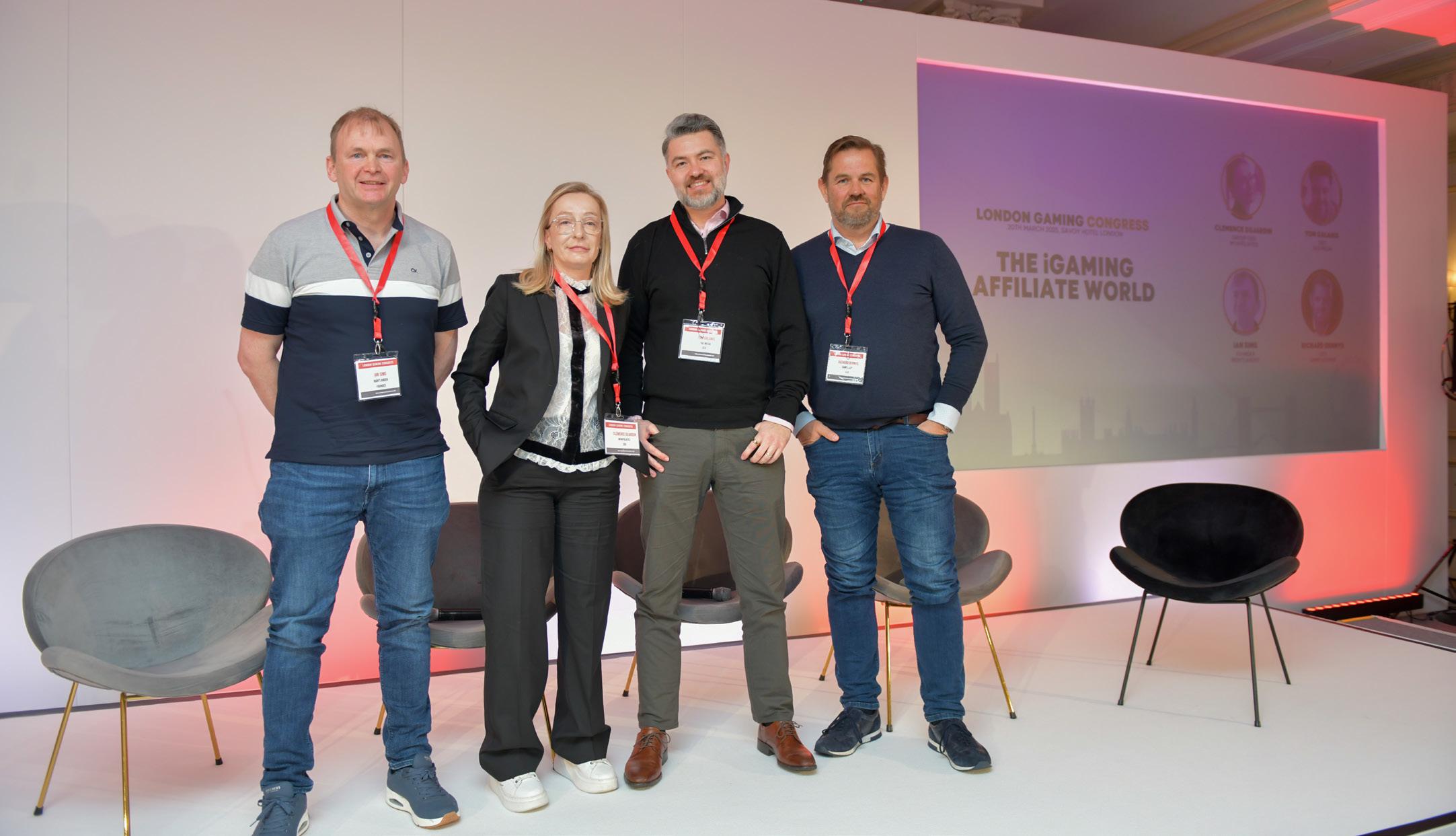

The closure of Casino St. Moritz has raised serious questions over the future of the Swiss gaming industry within the region. The decision to shut down the establishment was primarily driven by the withdrawal of its main investor, which has led to significant regulatory actions.
Casino St. Moritz, located in the picturesque Engadin valley, has been well known casino in the Swiss gaming scene. Established to cater to both locals and tourists, the casino offered a range of gaming options, including table games and slot machines. Its strategic location made it a popular destination for visitors seeking entertainment in the scenic backdrop of the Swiss Alps.
The casino has a rich history, having opened its doors in the early 20th century. Over the decades, it has tried to evolve to meet changing consumer preferences and regulatory requirements. The casino had been a key contributor to the local economy, providing jobs and attracting tourism to the region.
The closure of Casino St. Moritz was precipitated by the withdrawal of its primary investor, a decision that has been attributed to various economic factors. The Swiss Federal Gaming Board (SFGB) has indicated that the investor’s exit has rendered the casino unable to meet the legal requirements necessary for maintaining its gaming license.
The main shareholder’s decision
to withdraw funding was a pivotal moment for the casino. Without the necessary capital injection, the casino could not sustain its operations or comply with regulatory standards. This situation highlights the fragility of casino operations, which often depend heavily on investor confidence and financial backing.
The SFGB has strict regulations governing the operation of casinos in Switzerland, including requirements for sufficient equity capital. The inability of Casino St. Moritz to meet these standards led to the initiation of the license withdrawal process. The regulatory body has emphasized the importance of maintaining a robust financial foundation for gaming establishments to ensure their longterm viability.

The latest figures released by the Gambling Regulation and Inspection Service (SRIJ) in Portugal reveal that the gross revenue for the online gambling sector reached €323 million (approximately $366 million) in the fourth quarter of 2024. This rise marks a 42.1% increase compared to the same quarter in the previous year.
A substantial portion of this revenue growth can be attributed to the booming online sports betting segment. In the fourth quarter alone, sports wagering generated €138.3 million (around $157 million), nearly doubling the revenue from the same period in 2023. This surge indicates a growing interest among players in placing bets on various sporting events, particularly football.
In addition to sports betting, the online casino sector has also shown impressive results. Casino games, including popular options like online slots and roulette, contributed €184.6 million (approximately $209 million) to the overall revenue. This figure represents a nearly 20% increase yearover-year, underscoring the appeal of casino-style gaming among Portuguese players. The growth in revenue is further
complemented by a significant rise in new player registrations. Over 302,000 new accounts were created during the quarter, bringing the total number of registered online players in Portugal to nearly 4.72 million. Of these, approximately 1.23 million players engaged in at least one betting activity, reflecting a 12% increase from the previous year-end.
Football continues to dominate the sports betting market in Portugal, accounting for a staggering 75% of all sports wagers placed. Major events such as the UEFA Champions League, Portugal’s Primeira Liga, and the English Premier League have become focal points for bettors, driving substantial engagement and revenue.
Within the online casino sector, slot machines have emerged as the most favored gaming option. They accounted for over 80% of total online casino bets, showcasing their widespread appeal among players. The variety of themes, gameplay mechanics, and potential for substantial payouts contribute to their popularity. As the online gambling market expands, so does the emphasis on responsible gambling practices. By the end of 2024, over 292,000 individuals had opted for self-exclusion from
online gambling platforms, marking a 36% increase from the previous year. This trend reflects a growing awareness of responsible gambling measures and the importance of player protection.
While online gambling has seen explosive growth, land-based gambling establishments in Portugal have experienced more modest gains. In the same quarter, revenue from physical casinos rose by 12.5% year-over-year, reaching €72.6 million (approximately $82.2 million). However, this figure remains 4.3% lower than the revenue recorded in the third quarter of 2024.
Slot machines continue to lead the land-based gambling sector as well, generating €53.9 million (around $61 million). Additionally, casino table games and bingo collectively contributed €18.8 million (approximately $21.3 million), reflecting a 36.9% increase from the previous year. Notably, American roulette emerged as the highest-earning game in physical casinos, accounting for €6.9 million (around $7.8 million) in revenue during Q4.


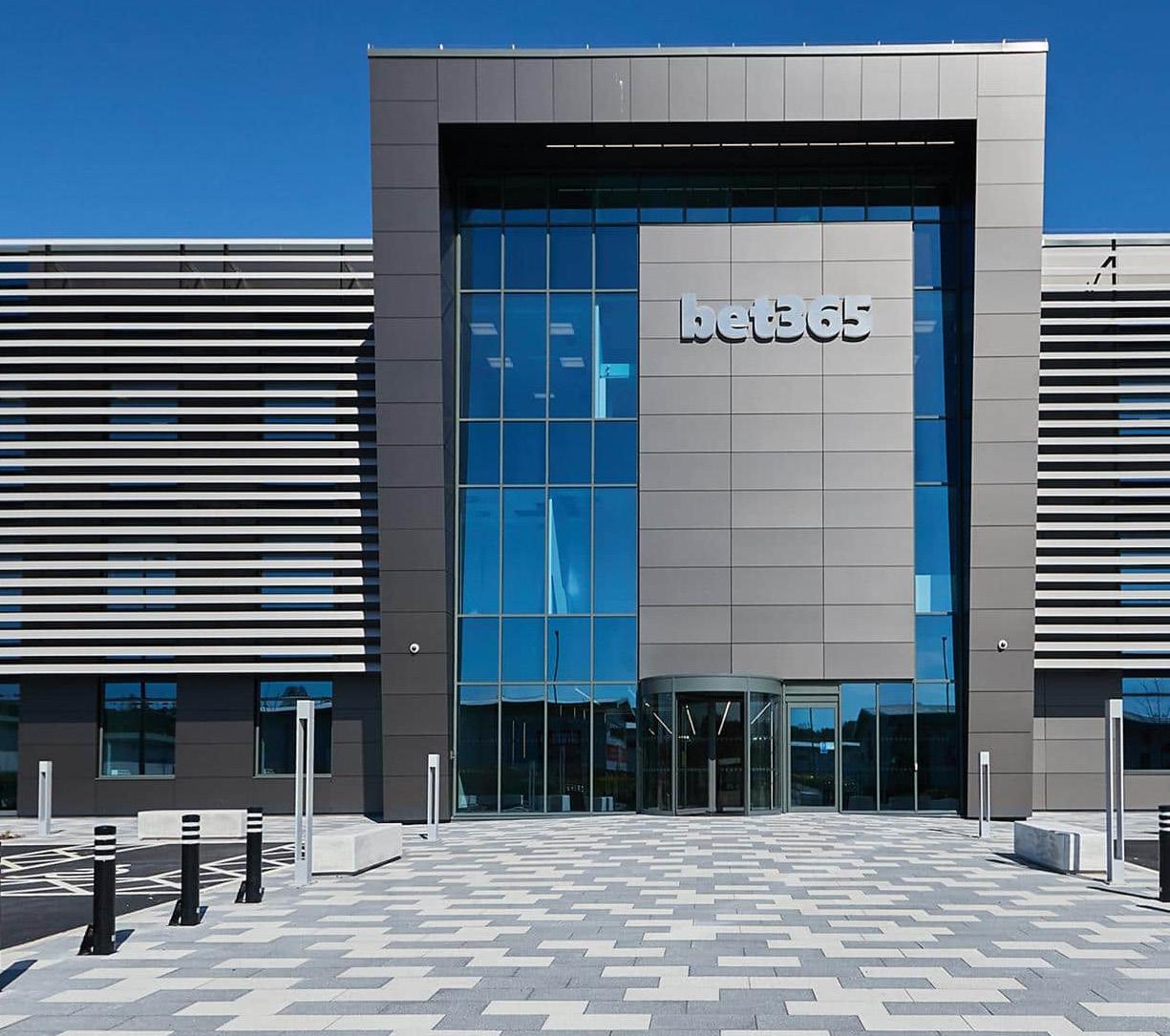
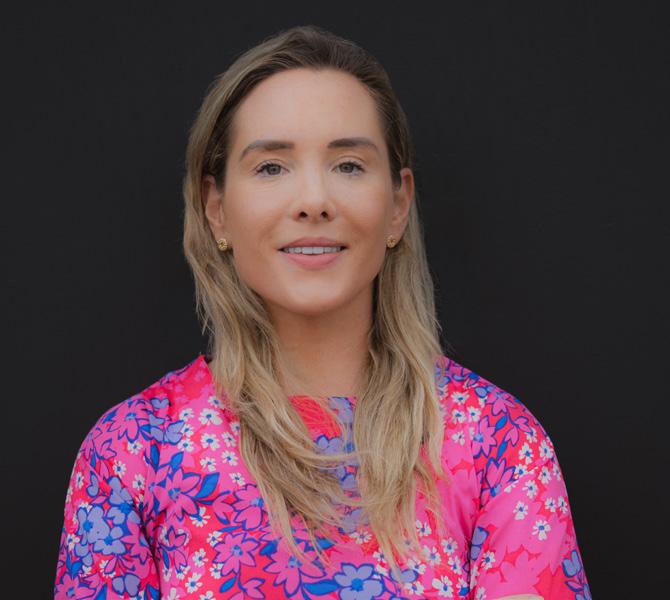
Cordelia Morgan – Cooper Founder CMC Consulting

Fiona Hickey Chief Business Officer Push Gaming
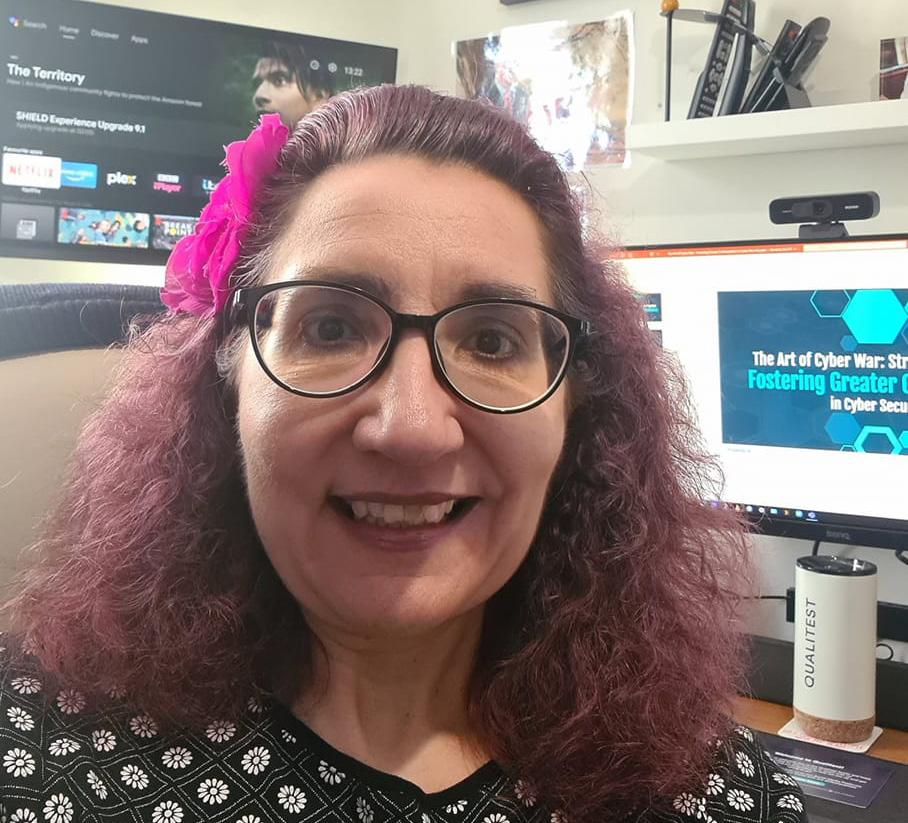
Mindset, Wellbeing & Mental Health Coach
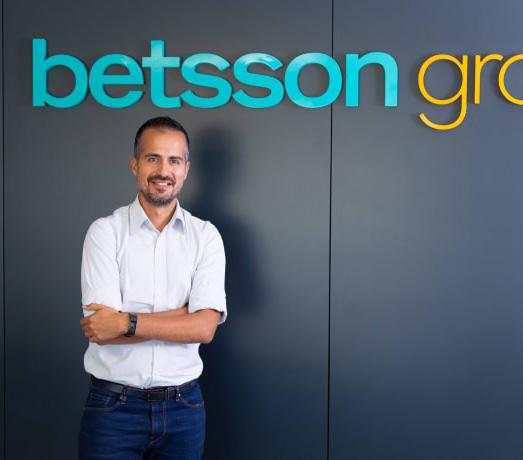
Roderick Spiteri Schillig Head of Communications Betsson Group

Ciara Nic Liam Managing Director Gaming at Entain


Sally Mohamed Internationa Business Development – IGT
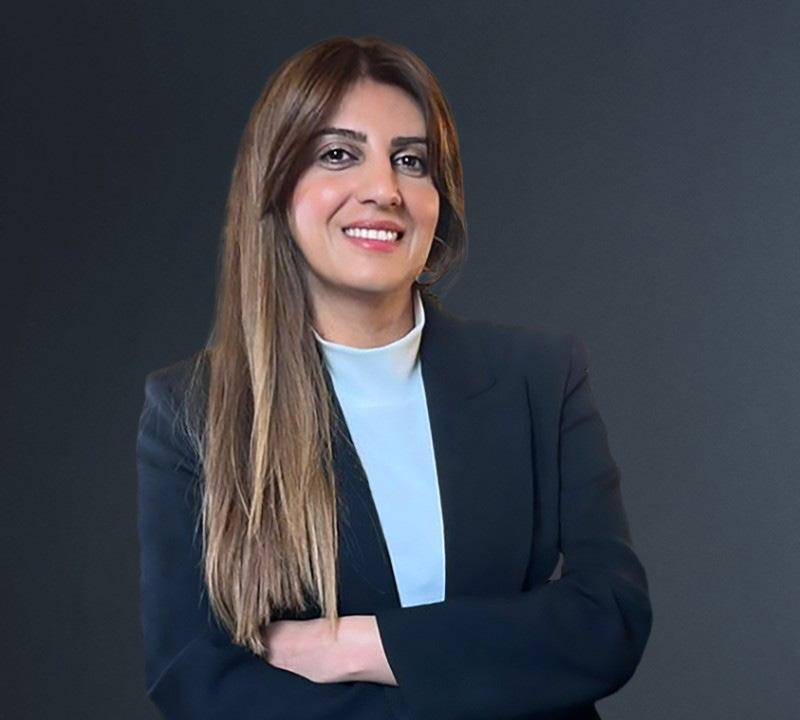
Aregnaz Hakobyan Group Chief Marketing Officer Digitain

Marija Hammon Marketing Director –Relax Gaming

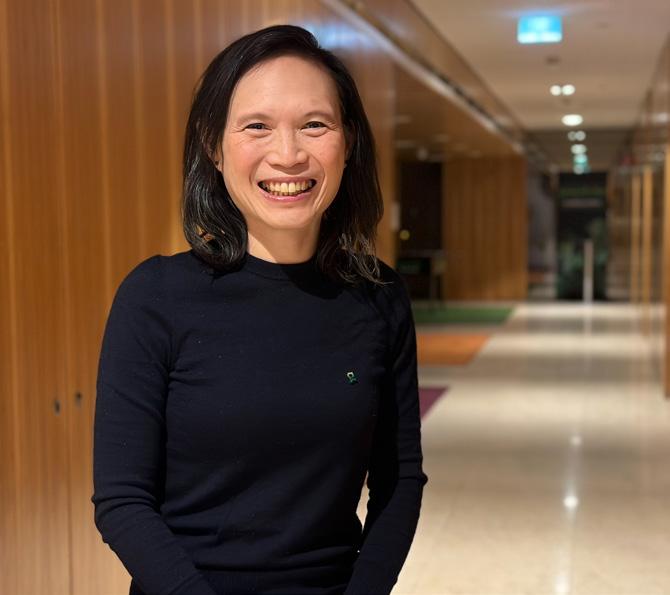
Creative Director & Design Studio Manager at



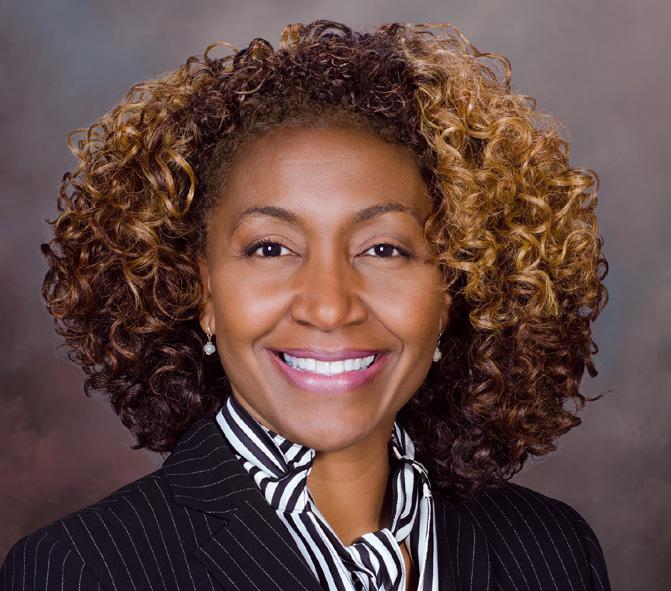
of Diversity, Equity and Inclusion Bally’s
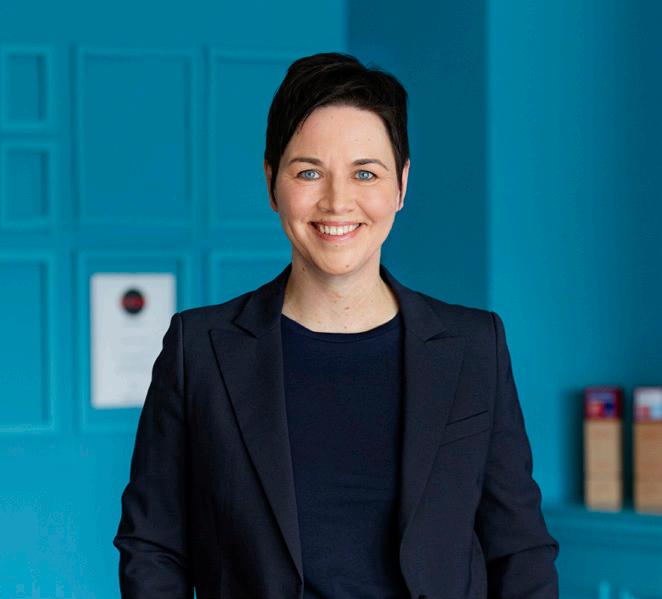
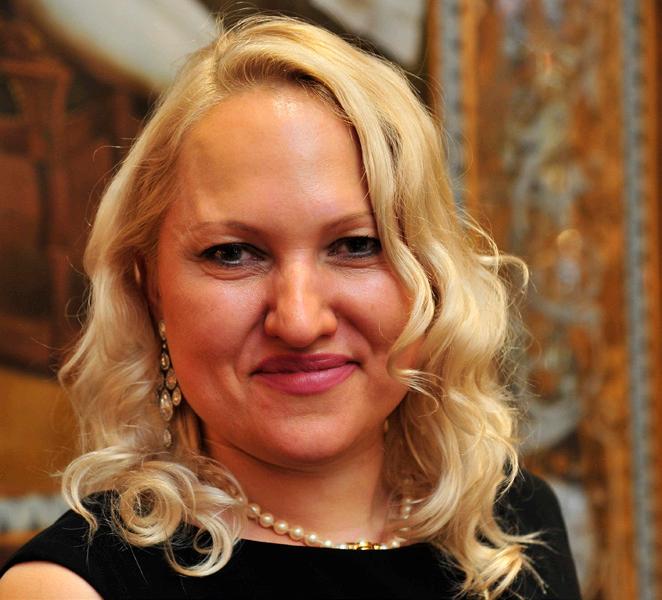
Thompson Director Clever Duck Media

Hamest Safaryan Regional Sales Team Manager at Digitain
The winners for the Women in Gaming Diversity & Inclusion Awards will be announced on the 5th June 2025 at the iconic Savoy Hotel in London in support of deserving charities. Tickets are sold on a first come first served basis and every year the ceremony is sold out weeks before the gala evening.
The WIG Diversity & Inclusion Awards are sponsored by Digitain, Arrise, Bally’s, Pronet Gaming, Betsson Group, Playtech, Relax Gaming, IGT, Gamomat, Greentube, Light & Wonder & Soft2Bet.

B2B Excellence Award (Companies)
DATA.BET
Digitain
Elantil – Commercial Team
EveryMatrix
Mkodo
Openbet
Skilrock Technologies
Soft2Bet
Wazdan
ARRISE
Betsson Group
Buzz x Stoke partnership
Global Gaming Women
Irene Markitani(Playtech)
Soft2Bet
The Rank Group plc
Wazdan
B2B Excellence Award
Alexandra Breinig (EveryMatrix)
Alli Rubin (Xpoint)
Diane Crookes (Playtech)
Janine Copperstone (PearFiction
Micol Mongiovi (ARRISE Play)
Miranda Andoniadou (Pragmatic
Nicola Wallbank (AGS)
Runa Walia Desai (Openbet)
Siobhan Lenehan (Playtech)
Company of the
BGaming
Digitain
Games Global
Hub88
Light & Wonder
Playtech
Pronet Gaming
Soft2Bet
SPRIBE

Award (Individuals)
(EveryMatrix)
(Playtech) (PearFiction Studios) powering Pragmatic (Pragmatic Solutions) (Openbet) (Playtech)
the Year - Supplier

Best Diverse Place To Work
Betsson Group
Booming Games
Entain Group
Games Global Gamingtec
GAMOMAT
Playtech
Soft2Bet
Corporate Wellbeing Initiative
Bally’s
Entain Group
Evoplay
Revpanda Group
Wazdan
the Year (Operator)
(LiveScore Group) Group)
(Bally’s) Customer Service Supplier
(Quickspin AB) Laboratories InGlobal) (Pragmatic Solutions) Wonder) (Playtech Neon) (Hub88) (Delasport) (Aristocrat)

Apprentice of the Year
Anna Zoltikova (Playtech)
Anete Dunina (Revpanda Group)
Emily Durrant (Entain)
Ezzie Critchlow (Entain)
Juliana Pereira (GiG)
Lena Benel (Aristocrat Interactive)
Affiliate Leader of the Year
Hasmik Movsisian(PartnerMatrix)
Revpanda Media
Sarah Sabo (BetMGM)
Shakyra Jonsson (Betsson)
Corporate Wellbeing Initiative
Bally’s
Entain Group
Evoplay
Revpanda Group
Wazdan
Company of the Year (Operator)
Betsson Group
Flutter Entertainment
The Rank Group PLC

Excellence in Customer Service – Operator Great Place to
Coolbet Customer Support Team in Mexico City
Gabriella Larsson (Betsson Group)
Melissa Spencelayh (LiveScore Group)
Chellyanne Cassar (Betsson Group)
Ellis Dawkins (Bally’s)
Laura Dennis (Bally’s)
Maisie Chilcott (Bally’s)
Scarlett Howarth (Buzz Group Ltd)
Amanda Ackerman (Design Works Gaming)
Desislava Velcheva (Pronet Gaming)
Karolina Wolkonowska (Wazdan)
Melanie Gauthier (PearFiction Studios)
Milena Sakune (Revpanda Group)
Perignea Axisa (GIG)
Ramona Petrina (Booming Games)
Stefania Zammit (GIG)
ARRISE Bally’s
BETER
Betsson Group
Evoplay
Flutter Entertainment
Play’n GO
Pronet Gaming
Soft2Bet
Industry Achiever
Anastassia Voronina (Bally’s)
Bethan Lloyd (Metropolitan
Elizabeth Suever (Bally’s)
Jennifer Winter(Bally’s)
Marianna Dora Matyas (Entain)
Sarah O’Neill (Mecca Bingo)
Sue Price (Grosvenor Casinos)
Susy Johnson(Bally’s)
Zeynep Öztuğ (Bally’s)


Innovator
BETBY
ELA Games
Elantil Commercial Team
Entain Group
Evoplay
Jen Cohen (Games Global)
Lena Nordin (Betsson Group)
Ralitsa Zareva(Delasport)
Soft2Bet
Alex Patten (Bally’s)
Chinta Vijaya Lakshmi (Entain)
Julia Suarez (Entain)
Kass Walsh (Bally’s)
Kate Parker (LiveScore Group)
Kristiina Kerma (Coolbet)
Kristina Verney (Entain)
Pranati Samal (Bally’s)
Rachel Moran (Buzz Group Ltd)
Rosie England (Bally’s)
Susy Johnson (Bally’s)
Inspiration of the
Angela Bradley (Entain)
Camila Calvete (Bally’s)
Cong Zhang (Bally’s)
Galya Pavlova (LiveScore
Gillian Baird (Buzz Group
Lena Nordin (Betsson Group)
Prathipati Sudha Maheswari
Sarah O’Neill (Mecca Bingo)
Taylor Hasim (Bally’s)
Leader of the Year
Virginie Luce (ARRISE powering
Amy Santos (Pragmatic Solutions)
Ani Mkrtchyan (Digitain)
Claire Osborne (Inspired)
Diane Crookes (Playtech)
Gina Lama (Pronet Gaming)
Ginnie Hollis (Gaming Laboratories
Ida Malagic (Greentube GmbH)
Jessica Feil (OpenBet)
Oksana Tsyhankova (Soft2Bet)
Shelley Hannah (Relax Gaming)
Siobhan Lane (Light & Wonder)

the Year – Operator
(LiveScore Group) Group Ltd) Group)
Maheswari (Entain) Bingo)
Year - Supplier
powering Pragmatic Play) Solutions) (Digitain) (Inspired) (Playtech) Gaming) Laboratories International) GmbH) (Soft2Bet) Gaming) Wonder)

Aida Vardanyan (Digitain)
Flavia Georgescu (Pragmatic Solutions)
Ida Malagic (Greentube GmbH)
Heather Payne (Playtech)
Kristina Garratt Mulligan (ARRISE powering Pragmatic Play)
Sandra Edstrom (Relax Gaming)
Soraia Figueiredo (Light & Wonder)
Stella Apostolopoulou (GLI)
Tilly Chandler (Pronet Gaming)
Trisha Sauerbrei (Aristocrat)
Marketing Campaign of the Year
1Spin4win – For “Don Catleone Hold and Win”
BGaming – For “When Art Meets Gaming”
Dorota Gruszka (Booming Games) For “Ronaldinho Gaúcho Campaign”
Lisa Trinder (Entain) For “Women in Leadership Apprenticeship Programme”
Greentube GmbH For “Celebrating Women’s Voices”
SPRIBE For “Diversity, Equity and Inclusion”
Tereza Melicharkova (Elantil) For “Elantil’s Launch Campaign”

Adebukola Siakpere (LiveScore Group)
Anat Lupo (Bally’s)
Deepika Chilakamarri (Entain)
Lara Lombardi (Betsson Group)
Nikki Ashby (Buzz Group Ltd)
Sue Price (Grosvenor Casinos)
Anijah Boyd (Light & Wonder)
Jade Stanswood (Aristocrat)
Josmar Diaz (EveryMatrix)
Kelly Arnold (IGT)
Leah Neutel (Relax Gaming)
Marianne Deguzman (Pronet Gaming)
Nicole Dwenger (Mindway AI)
Polya Vasilleva (Pragmatic Solutions)
Rebecca Zammit (ARRISE powering Pragmatic Play)
Tonya Mollovska (Playtech)
Triinu Tikku (Hub88)
Dr Alexandra Krone (GAMOMAT)
Andrea Bossard (GLI)
Jade Sienna Ricciardi (Pronet
Mareike Franke (Playtech)
Marisa Barden (Playtech)
Nicole Barlow (Pear Fiction
Nicole Nascimento (Aristocrat)
Oksana Tsyhankova (Soft2Bet)
Sarah Williamson (Light
Svitlana Kravchenko (Pragmatic
Erica Anderson (Income
Gina Lama (Pronet Gaming)
Ida Malagic (Greentube GmbH)
Katarzyna Pysz (3 Oaks Gaming)
Lina Sennevall (Square in
Marija Gafa (GIG)
Nadiya Attard (Elantil)
Sonya Ishak (Aristocrat)
Taylor Hasim (Bally’s)

of the Year - Supplier (GAMOMAT) (Pronet Gaming) (Playtech) (Playtech) Fiction Studios) (Aristocrat) (Soft2Bet) & Wonder) (Pragmatic Solutions) Outstanding Mentor Award Access) Gaming) GmbH) Gaming) in the Air)

of
Ankita Makin (Entain)
Jessica Carrillo Miranda (Betsson Group)
Katie Kohler (Bet MGM)
Mariana Oliveira (Bally’s)
Mouni Dharipelly (Entain)
Raliat Adenuga (Bally’s)
Stephanie O’Connor (LiveScore Group)
Tace McWilliam (Bally’s)
Young Leader of the Year (Supplier)
Haley Gilson (Light & Wonder)
Jade Sienna Ricciardi (Pronet Gaming)
Kaitlin Galea (Aristocrat)
Krista Lase (Playtech)
Lottie Wood (Playtech)
Masa Ticar (Pragmatic Solutions)
Natalie Loshatynska (DATA.BET)
Olga Hlukhovskaya (1spin4win)
Zoe Ebling (AGS)
The London Gaming Congress (LGC) 2025 heard from leading figures within the diversity & inclusion sector in our industry, in this hugely popular panel discussion. Taking part on the panel was, Leila Goelz - Chief People and Transformation Officer Games Global, Cellene Hoogenkamp - CEO & Founder Kokuahub & Sally Mohamed - Global ilottery Account Director IGT Below is the transcript from the panel discussion covering some amazing insights.
So t he first question, what does DEI mean to you and I suppose to your company as well? So Leila. Hi Colin, hi everyone, can you hear me okay? So my name’s Leila, I’m the Chief People Officer at Games Global. And for those that don’t know, Games Global provide online gaming content into the market.
A nd with having over 1,300 exclusive games presented to the market in various markets, along with over 40 studios globally, you could say that DEI is incredibly important. To be able to offer a range of content offering to our customers, there’s no way that you’d be able to create content that is diverse with having one thought process, one way of thinking and a cookie cutter approach to people. This,
for us, I think is really embedded within the organisation.
We don’t have a specific standalone EDI policy, but rather we embed and have the threads of an EDI approach in the business throughout the organisation, which I will go through shortly. And that’s also driven by our leadership team. So with over 1,400 people across 10 different locations, our leadership team, we have 40% female and 60% male across four different nationalities and a range of different countries with an age spread of between kind of late 30s to mid 60s.
I feel it’s really driven. You can. It’s really driven from the top.
A nd I think having that diverse rep -
resentation as a leadership team, it really embodies through the organisation. And you see it even from our management statistics. Interestingly, whilst we have a 60-40 split throughout the organisation, there’s pockets of the business where the gender balance moves more towards women, more men.
A nd of course, EDI is not just about gender. It’s about that diversity of thought. Absolutely.
D oes Walter Bugno, CEO, support EDI at all? Well, he’s here. Shall we ask him? No, he absolutely does. He’s built a really strong team, if I can say that, within the organisation.
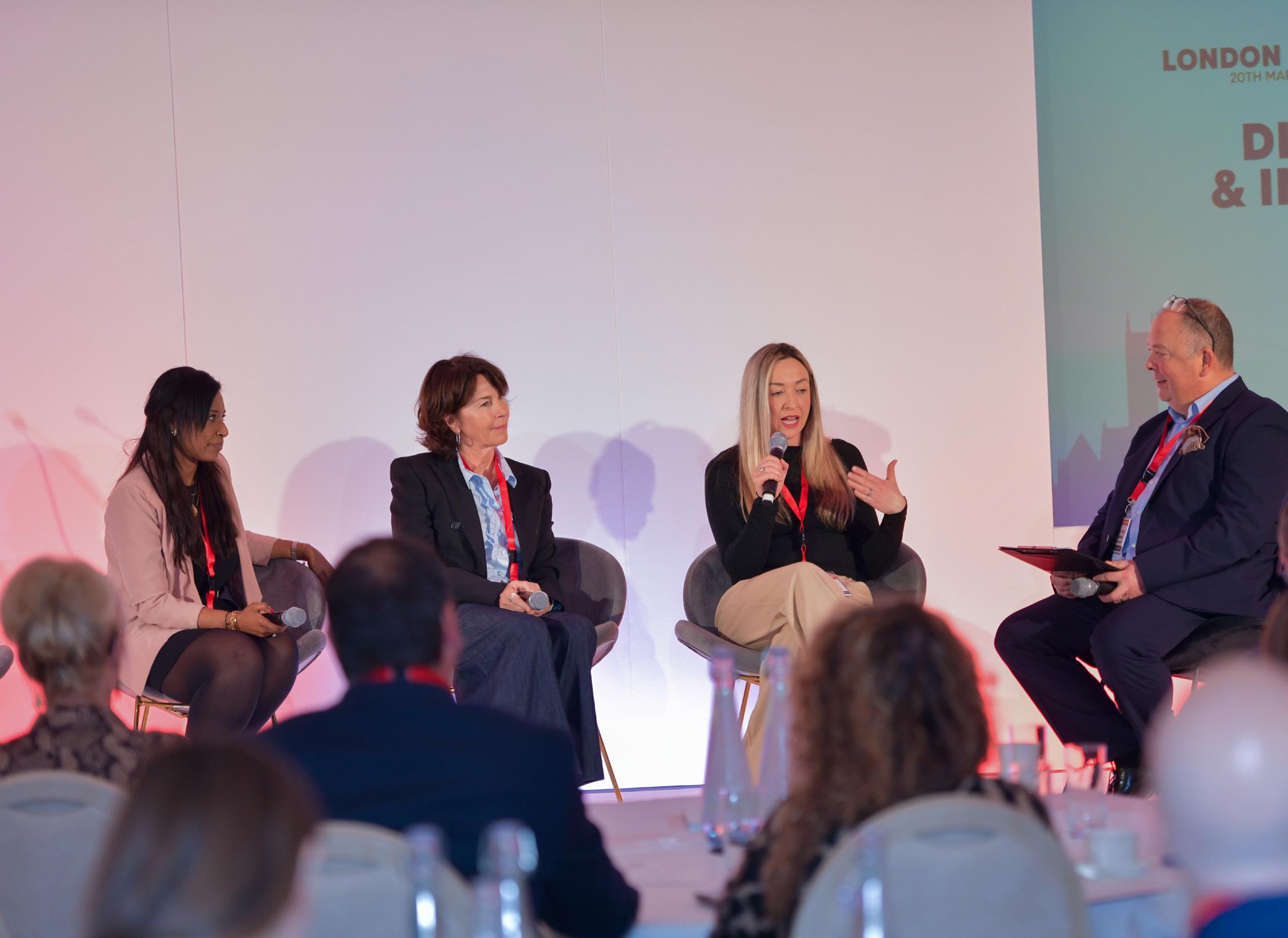
Having female representation as one area of EDI. I obviously represent the people team. And it is a heavily female-dominated area.
But we have Kim here today, who’s our Chief Compliance Officer. Our Chief Revenue Officer is female. And again, it goes back to not... It’s not about just stating on paper and having this checkbox.
He’s always been a CEO that says it’s not about quotas. It’s about bringing people into the organisation. I have a question for you.
What does EDI mean to you and the company? Good morning. Can you hear me okay? First of all, thank you for inviting me. I belong to the baby boomer group.
So I look upon my kids as snowflakes. And I’ve got to learn more of that. So I’m the founder and CEO of Kokua Hub.
Kokua actually means it’s the Hawaiian word for to help. Japanese word for to help unconditionally. And that probably means we are coaches.
The platform, the hub is... We have about 70 globally certified coaches. Any time zone. Age between... For a coach to be effective, you have to be with experience 30+.
So between 30 and 65. And that’s what we do. We provide coaching.
And so I’m here to really speak about the industry, generally perspective, not just from the gaming point of view. And before we started this, the
notes we got was like DI. And I said, what happened to the E? We started talking about what is the E? Why did Colin have a Freudian slip? Did it drop off? And so we actually looked at what about if we reframe the E for equity and equality to empathy.
And we thought, okay, because to really have a value of DEI in the industry, we as people need to speak from our vantage point to include what the other people, other people in our workforce, what they’re going through from a life, home, professional perspective. And if we don’t start putting ourselves in their shoes, we will struggle with inclusivity. And as Lena was saying this morning, in my mind, we need labels.
So that’s the label we need to work through with people. So it’s also sometimes an individual resistance. So, Sally.
Same question to you. What does the EI mean to you and the company, IGT? Okay, thank you. Hi, I’m Sally Mohamed.
I work for IGT as head of account management. So thank you for inviting me. I am no, I’ll just preface this by saying, well, I’m no DEI expert at all, but I am an advocate.
So for many years I have been very involved in many DEI initiatives through IGT. And I really believe that it’s something that has actually helped me in my career development, honestly. It’s allowed me to sort of feel heard, seen, supported in many ways, and have a sense of belonging, I think, in a lot of ways, regardless of my gender, my age, my race.
I think it has really given me a platform and the support to actually really move forward in my career. And we’ve done, we’ve had a lot of, for IGT in itself, they have set up a diversity, equity, and inclusion office. They did that many years ago, and it’s gone from strength to strength.
There are a number of initiatives they have built through the office. We also have the diversity and inclusion equity councils as well, which actually brings in the full workforce, allowing them to sort of ensure that we are building in unity, making sure that everybody is heard, understood. So there’s also regional diversity and inclusion councils, and I have
been a member of that for many years.
And we also have a number of what we call employee impact groups, which allows the individual or a number of people to come together, build a network in whatever they believe in, and allow people to come in. So I myself have had the opportunity to set up a women inclusion network for the UK chapter, which I’m really proud of. We’ve also managed to have a number of initiatives that bring awareness, which is what you were talking about, to things that may be quite challenging for anybody to deal with.
So subjects like menopause, subjects like baby loss awareness, for instance, things around balancing commitments, lots of the human aspects that impact women and men in the workplace. So we deal with all of that, and it’s allowing us, having the DEI platform allows people a safe space to be able to share their experiences. And for me it’s about also learning about other people’s experiences, not only just sharing my own experience.
A question then, Sally, for that. Because obviously IGT are a huge company. And we’ve seen it with the Women in Gaming Diversity Awards, that IGT has supported pretty much from the beginning.
And I think over those years, women have been more recognised, more accepted. There’s some CEOs of women here today. But the different demographic of diverse and inclusion, has that still got some
way to go in companies? As in you mean other areas outside of the gender piece? Yes, absolutely.
I think the idea is for diversity and inclusion to allow all networks and areas to come forward and build their own, to be able to be heard and seen. So that’s how IGT deals with it. As I said, the EIG groups allows for that.
So we have something called Super Abilities. This looks at people with disabilities, for instance. There’s people that, I’m part of the ACE group, which is actually Advancing Cultural Education.
That’s set up by a bunch of African descent, people of African descent who come together, they network together, they look at supporting each other. But we also celebrate or openly allow everybody to celebrate anything that they want to. So we celebrate Diwali, we celebrate Christmas, we celebrate International Women’s Day, we celebrate International Men’s Day, because every time we have to do that.
When is that day? I don’t know. See, I know 8th of March, but you don’t know Men’s Day. You have a Men’s Gaming Award.
Yeah. We celebrate everything. We celebrate African... Sorry, we celebrate Black History Month as well.
So many things. Isn’t there a danger, though, with that? Because obviously you try and include every... But then you could miss one out, and then you’re going to upset a certain demographic.
It’s an open forum, so we allow everybody to come forward and put anything forward that they want to.
That’s the whole idea. The idea is that you should feel heard, you should feel a sense of belonging, and you should be able to just come forward and talk about anything it is that you want to bring forward, and generally as a rule. I think we’ve got something like 10 or 12 different EIGs that celebrate different things.
Right. Let’s move on. We should be on one question for the whole session.
So, second question. What are you currently doing to embrace DEI? And I’ll ask Leila first. So, like Sally and IGT, we have the different groups that are employee-led.
We call them our authenticity triangles, which leads into our values of authenticity, and these are driven by individuals within the organisation, there’s a women in leadership triangle, there’s a men’s leadership triangle, there’s a pride group, there’s a mental health group, and the more we give airtime to this within the company and make it more accessible and seem to be promoting and really supporting it, the more people are coming forward and saying, actually, I really want to set up X, Y, and Z, and we facilitate those within. We also... We love data, and so we go back to our workforce planning, and this is really key for us, particularly within the people team, of looking at our workforce planning and our people and really levelling the
playing field. So, everybody will know, you know, Sheryl Sandberg, and, you know, she states about, you know, particularly women will put themselves forward for a role that they meet 100%, men will be 50%, women get promoted based on the achievement, men more so based on their potential, and we tie this back to things like our promotions and our forecasting and the workforce planning so that it really levels that playing field and brings it back to, okay, what have these people achieved, what’s the potential within that, and try and remove the bias within it as well.
There’s always going to be a degree of subjectivity, but it’s just creating more awareness, more education, and more understanding around that as we go through the business. So, as I mentioned before, there’s lots of ways that we really embrace and educate. We have Games Global University, which we look at, you know, it does success tracks in different areas, new starters.
We have leadership, but we’ve also now set up an area which we call our neuroverse, and this is about, you know, neurodiversity, about creating awareness and having support on that that people can access as well. And, again, by promoting that and removing the stigma around it, people come forward and say, I want to be a part of that and drive it forward. Sally? Yeah, literally everything you’re saying.
I think I’d already, you know, touched upon this. Essentially, this is the EIG’s part, the way of bringing people together and
allowing them the ability and the freedom to build their own networks, essentially, is the best way in getting them all involved and engaged. And, essentially, what we’ve found is that that piece of engagement, that piece of being heard and being able to, a sense of belonging, really does help with our retention of staff and ability to feeling that they, you know, can move forward.
Right. I’ll ask Celine first this question. What benefits do a diverse group of employees bring to a company? So, obviously, it’s politically correct, but what are the actual benefits for a company? Well, if you logically look at the word diversity, it means different, right? So the more different voices you hear around the table, the more innovation will happen.
I mean, it’s a well-known statistic that innovation is driven by diversity. Because people, when they feel inclusive, they feel they can contribute to the conversation. People who don’t feel included or they don’t feel they belong to an organisation don’t share.
They just pull back. You don’t get their wisdom or their experience. So I think one real benefit, which is proven research-wise, is innovation.
Of course, that depends on the communication structures within the organisation, but it’s a big driver for the impact. I think another big benefit is that we actually, and I think Lina pointed to it.


Because I was surprised to find that, you know, 90% of women still haven’t made it to the boards. And there is a lot of research to say there’s no need for that because those... If you look at organisations that have female CEOs, given some industries perform better with male, female, different minorities.
It depends very much also on the industry. There’s a lot of evidence to show that they are, with balance sheets, with strategies, equally or not better than many, many men. And so I don’t think it was a conscious decision to have this imbalance happen.
I think it happened more, like, unconsciously because of the 50s, the 60s, how people were labelled. So I think that’s now the job, to establish how we lift... And we’ve come a long way in lifted women and minority groups through organisations, but we’ve got a long way to go still. I think the data shows it.
So, Leila, I mean, we’ve got about a minute each on the next
question. So, within Games Global, what are the benefits of a diverse culture within the company? And does it... The same as Celine, the same question is, are you doing it politically because it’s right, or does it show that it actually works for the company? So, for us, if you go back to good old Maslow’s hierarchy of need, there’s belonging, which is a key need, right? So, by having a really inclusive culture, that people feel like they belong, you have engaged people throughout the business. And then those engaged people, they want to stay with the business, they want to grow and develop.
And then it also enables you, then, to attract really great talent to the organisation. So, yeah, 100% from me. And then also, from a bottomline perspective, as I mentioned before, we have to have diversity because we have to have that diversity of thought throughout the organisation to enable us to produce what we do best, and that is incredibly good games and content.
And we can’t do that by just having, you know, a one-sizefits-all approach. So, I truly believe that our business model is coincidentally underpinned by EDI because without having that diversity, we wouldn’t be as successful as what we are. You must have a lot of diversity in your game studios.
I mean, how many... I’m sure Walter will tell us later. I mean, you have such a diverse culture in your... How many game studios do you have? Just actually to barge into the conversation. That’s another benefit of DEI because when you have that diversity, you also need to look at our customer base.
This article covered only 15 mins of a fascinating panel discussion. The next LGC will take place in 2026 again in London at the Savoy Hotel.
Interested to learn more? Contact us for more details.





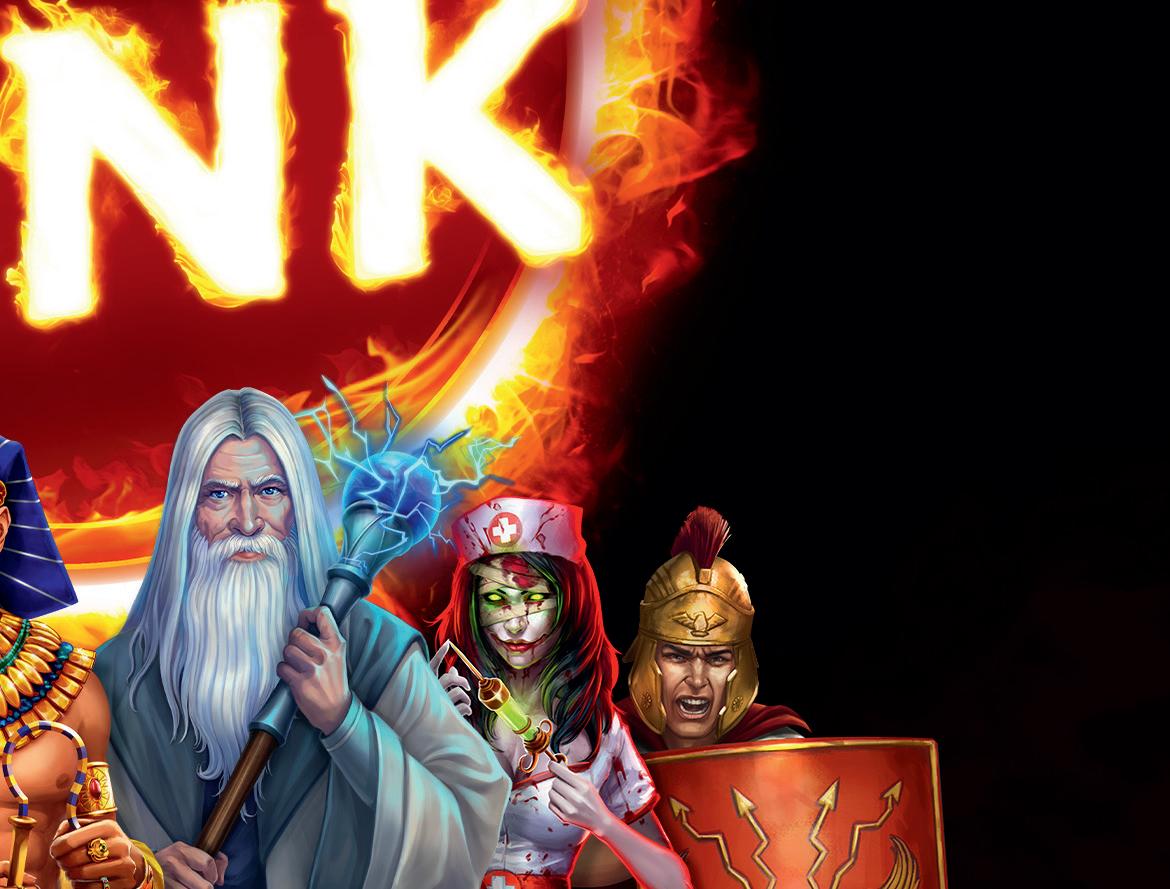






Top-performing and game-changing Money Gong™ Multi-Level Progressives that’s rocking performance charts in EMEA! Incorporating innovative mechanics, exciting bonus boosters and massive jackpots players seek.

Evoke reported a modest increase in overall revenues, with a 1% rise to £437 million for the first quarter ending March 31. However, this growth comes amidst challenges in the UK and Ireland markets the company says, where online revenues have dipped by 1%. The decline can be attributed to a decrease in sports betting revenues, which have been adversely affected by the implementation of new safer gambling measures.
Total Revenue: £437 million (up 1% year-on-year), with Active Players: Decreaseing by 21% and Gaming Revenue Growth seeing a 3% increase in the gaming sector.
The UK government has introduced a series of regulations aimed at enhancing player protection. These include stricter age verification processes and identity checks for online gambling operators. Such measures are designed to ensure that gambling remains a safe and responsible activity, but they have also led to a decline
in active players for companies like Evoke.
Age Verification: Enhanced checks , Identity Verification: Stricter requirements for confirming the identity of users and Promotional Restrictions: Limitations on promotional activities.
These regulations have resulted in a 21% drop in active players for Evoke, highlighting the immediate impact of the new rules on customer engagement.
In response to the challenges posed by these regulations, Evoke has taken active steps to enhance its market position. The company says it is focusing on improving customer lifecycle management and refining its value proposition to retain existing players and attract new ones.
While the UK market faces challenges, Evoke has reported stronger performance in its international operations. The company experienced an 11% increase in international revenues
during the first quarter, driven primarily by growth in Romania.
Evoke’s retail segment, which includes betting shops, has also faced difficulties, with sales declining by 6% year-on-year. This decline reflects broader trends in the retail gambling sector, where foot traffic and in-store engagement have been impacted by changing consumer behaviors and increased online competition.
Per Widerstrom, chief executive of Evoke, said: “We are building momentum in the right areas of the business with particularly strong growth across our international core markets. Whilst the UK&I online and retail performance was behind where we wanted to be in Q1, we have moved swiftly to improve some of the underlying drivers of the performance and have been seeing stronger trends in April.”

In March 2025, Nevada’s gaming revenue saw a decline, marking a 1.11% drop compared to the previous year. This downturn is particularly concerning as it represents the weakest performance for March since 2021, a year heavily impacted by the COVID-19 pandemic. The total gaming win for the state reached approximately $1.27 billion, a stark contrast to the record highs seen in late 2024.
The reason for the slowdown on the strip can be put to, The Strip, which typically accounts for a significant portion of the state’s gaming income, reported a revenue decrease of 4.78%, totaling around $681.67 million.
The Las Vegas Convention and Visitors Authority reported that March 2025 saw approximately 3.39 million visitors, a 7.8% decrease compared to the same month in the previous year. This decline in tourism has been a signifi -
cant driver of reduced gaming activity, as fewer visitors typically translate to lower spending in casinos.
Economic conditions have also played a role in shaping visitor behavior. Following a record-breaking revenue month in December 2024, uncertainty surrounding the economy has dampened consumer confidence. As potential visitors weigh their options, many may opt for alternative destinations or postpone travel plans altogether.
The availability of hotel rooms is another critical factor affecting tourism and, consequently, gaming revenue. The recent closure of the Tropicana, which removed 1,470 rooms from the market, coupled with ongoing renovations at The Mirage, has further strained the inventory of available accommodations.
While the decline in tourism has been
significant, it is essential to consider the influence of major events on gaming revenue. Notable occurrences, such as Super Bowl LVIII and the inaugural F1 Las Vegas Grand Prix, previously drove substantial visitor traffic and gaming activity. However, the absence of similar events in the current period may contribute to the observed revenue decline.
High-stakes gaming, particularly baccarat, has also seen a downturn. In March 2025, baccarat losses reached over $73 million, reflecting a 34.27% decrease compared to the same month in 2024. This decline is particularly striking when juxtaposed with the game’s performance in December 2024, which generated $197.2 million.
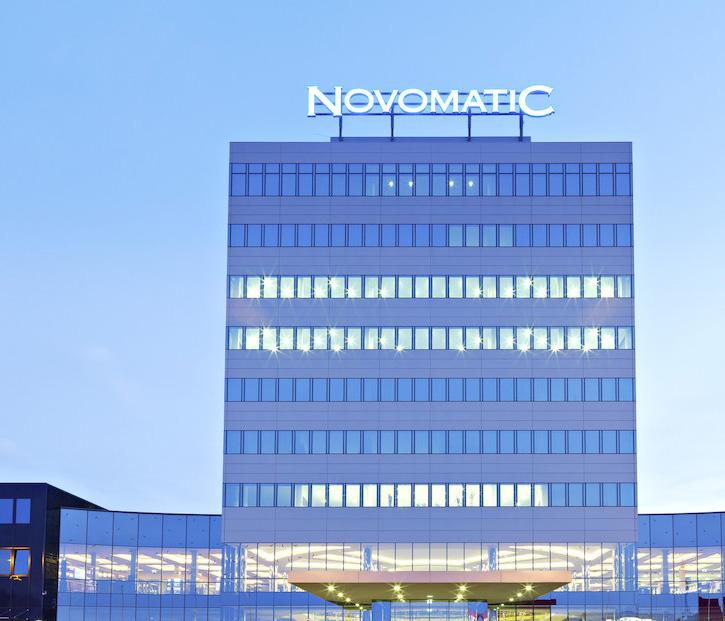
NOVOMATIC announced that it has entered into a Scheme Implementation Deed with Ainsworth Game Technology (Ainsworth) to acquire all of the outstanding shares of Ainsworth for a best and final cash consideration of $1.00 per share via a Scheme of Arrangement.
Ainsworth’s Independent Board Committee has unanimously recommended that Ainsworth shareholders vote in favour of the transaction. NOVOMATIC holds an existing stake of 52.9 per cent in Ainsworth, which it purchased in 2016 from founder Len
Ainsworth.
The transaction is subject to, among other things, Ainsworth shareholder approval and customary closing conditions, and is expected to close in the second half of 2025. The NOVOMATIC offer is not conditional on due diligence or regulatory approvals. Foreign Investment Review Board approval has been received.
Stefan Krenn, Member of the Executive Board of NOVOMATIC AG Group stated: “The acquisition of Ainsworth is consistent with our international growth strategy and the expansion of our presence across the Asia-Pacific
and the US region. As a long-term shareholder we are familiar with the business and believe that integrating Ainsworth into our operations is in the best interest of this strategy. We look forward to welcoming the highly qualified and experienced Ainsworth employees into the NOVOMATIC family to become part of our international growth and success.”
Ainsworth is listed on the Australian Securities Exchange (ASX), with headquarters in Newington, Sydney and operations worldwide, including North and South America.


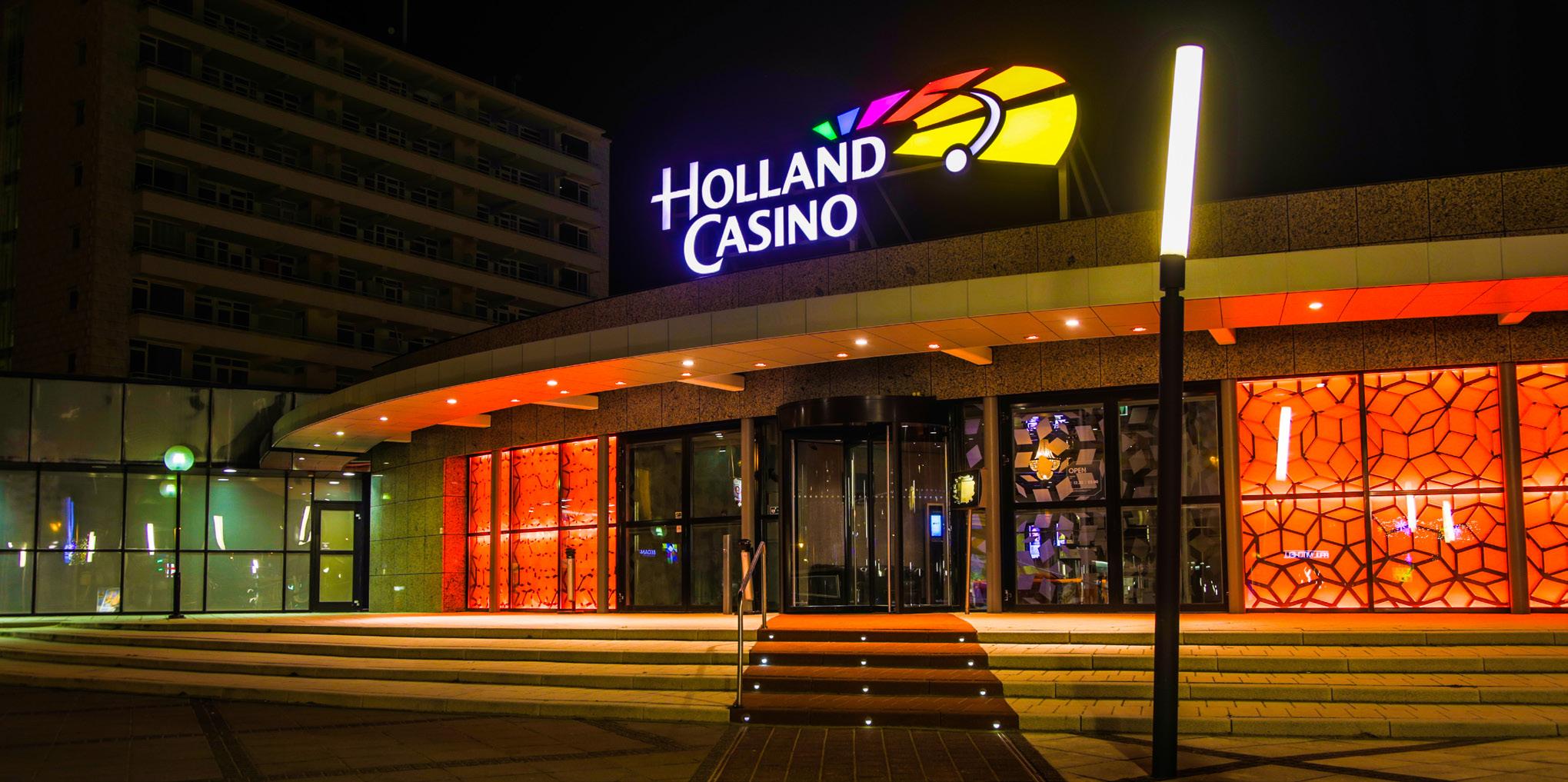
Holland Casino, the stateowned gambling operator in the Netherlands, is facing significant challenges that cast doubt on its long-term viability. The company has expressed concerns regarding the impact of rising gambling taxes and operational costs, which could jeopardize its future.
In its latest annual report, Holland Casino revealed a loss of €10.4 million for the previous year, despite an increase in visitor numbers, the average spending per guest has declined, indicating a shift in consumer behavior.
The anticipated increase in gambling taxes is expected to exacerbate the financial strain on Holland Casino. The company has acknowledged that these rising costs could lead to “material uncertainty” regarding its ability to sustain operations in the coming years. As the tax burden grows, the casino chain must find ways to adapt to this challenging environment while maintaining profitability.
Holland Casino’s online platform has also reported a decrease in turnover, mirroring trends observed across the
gambling sector. The shift towards digital gaming has not translated into increased revenue for the company, raising questions about its competitive positioning in an increasingly crowded market.
In response to the financial pressures, Holland Casino has initiated a series of organizational changes aimed at streamlining operations. This restructuring has resulted in job losses for hundreds of employees at the company’s headquarters.
As part of its cost-cutting measures, Holland Casino has made the decision to close one of its locations in Zandvoort. Additionally, the casino chain is experimenting with lower payout odds at games like roulette, a move that could further alienate customers.
During the COVID-19 pandemic, Holland Casino received temporary relief from the Dutch Tax Authority, allowing for a payment break on debts accrued during the crisis. This measure provided the company with some much-needed breathing room, enabling it to navigate the immedi -
ate financial challenges posed by the pandemic. However, now the industry has recovered, the looming increase in gambling taxes presents a new set of hurdles.
The government has announced plans to raise gambling taxes in both the current year and 2026. While these measures are intended to bolster public finances, they could have unintended consequences for Holland Casino.
While Holland Casino has not disclosed specific strategies to improve its financial situation, the company is actively exploring various options. The management is keenly aware of the need to adapt to the changing landscape and is committed to monitoring costs closely. Digital transformation is also on the agenda, with plans to enhance the online gaming experience and streamline operations.
